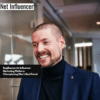Agency
AI Meets LinkedIn: Why EasyGen Founder Ruben Hassid Is Betting On Business Networking

The creator economy is undergoing major shifts, and a new player is charging forward by focusing on an often-overlooked platform: LinkedIn. Ruben Hassid, founder of EasyGen, plans to transform how professionals approach content creation on the world’s largest business networking site. With his AI-powered SaaS tool, Ruben is betting that LinkedIn’s untapped potential could rival the established dominance of platforms like YouTube.
EasyGen, which Ruben describes as a “$2-a-day ghostwriter,” aims to lower the barrier to entry for LinkedIn content creation. The tool comes at a time when the platform boasts over 130 million daily active users but only 150,000 active creators. According to the French entrepreneur, this disparity represents both a challenge and an opportunity he and his team are eager to address. Ruben shares his vision and the technology behind EasyGen, which is poised to shake up the LinkedIn ecosystem.
EasyGen Founder to Democratize LinkedIn Content Creation
Ruben is on a mission to help more people create content on LinkedIn. His journey to founding EasyGen began with his success on the business network. With a background in prompt engineering and AI, Ruben teamed up with serial entrepreneur Pete Sena to develop a system to generate LinkedIn posts with minimal user input. Ruben reports reaching an average of 120 million people organically over the past two years. This experience led him to develop a newsletter and explore how AI could assist in content creation.
From Frustration to Innovation
The inspiration for EasyGen came from Ruben’s frustration with existing language models like ChatGPT, which he found inadequate for his needs. He turned to more advanced techniques, including what he calls “agent workflow.” “Basically, it’s [language models] talking to each other. And you’re the one who’s the orchestra,” Ruben explains. “You’re the manager of the [language models]. You have a team.”
Initially, Ruben built the system for his use. “I’m kind of like a mad scientist,” he says. “I like to make some [experiments].” After several months of development, he created a generator that could produce LinkedIn posts with what he estimates as 80% accuracy.
The transition from personal tool to SaaS product came at the suggestion of Peter Skinner, a serial entrepreneur from Connecticut. Ruben recounts, “He told me I should probably do a SaaS tool, a software because I’m pretty good at prompt engineering.'”
Testing the Waters
To demonstrate EasyGen’s effectiveness, Ruben enlisted two employees to use the tool on their LinkedIn accounts. Starting from scratch, he reports that within 35 days, their accounts reached a combined 1.4 million people without paid advertising.
“I couldn’t tell people, ‘Hey, it’s working, trust me,’ because people can hardly relate to me,” Ruben explains his rationale for this experiment. “Stories need to be relatable.”
The social media vet sees EasyGen as part of a larger ecosystem of tools and strategies for content creation. “It’s a set of tools. It’s a whole journey to experience that I wanted to give to people,” he states.
While the tool is still in its early stages, Ruben’s vision extends beyond simply automating post-creation. He wants to empower users with knowledge gained from his decade in social media, including tips on finding information and ideas.
As EasyGen continues to develop, Ruben remains focused on the human element of content creation. “Even though I’m known as one of the AI guys on LinkedIn, I still think it’s human first,” he emphasizes. “I always say powered by AI, made by humans because I’ve been in the ins and outs of content creation. And I can tell you that if you take out the humans in the equation, it doesn’t work.”
EasyGen: A $2-a-Day Ghostwriter in Your Pocket
Ruben positions EasyGen as an affordable alternative to traditional ghostwriting services for LinkedIn content creation. “You pay $2 a day. You have a full-time ghostwriter working for you 24 over seven,” he explains.
The founder emphasizes LinkedIn’s unique value as a professional network. “LinkedIn is the most powerful network for professional people. It’s the only one that is not anonymous,” he says. This transparency, he argues, makes it a crucial platform for professional development and networking.
EasyGen’s goal is to lower the barrier to entry for content creation on LinkedIn. Ruben sees two primary paths for users: “Either you learn the hard way, and it takes years. Or you pay for a ghostwriter. It’s like $2,000, $3,000.”
However, Ruben believes EasyGen offers more than just cost savings. “I want to empower them by helping them write better. But in the end, it’s training them to write the right way,” he states, highlighting the tool’s potential as a learning aid for improving writing skills.
Where EasyGen Positions Within Industry Trends
VidCon 2024 took place in Anaheim, California, from June 26 to 29. The convention gathered a star-studded lineup of content creators, influencers, and creator economy professionals and enthusiasts. Fresh from attending the event, Ruben offers insights into current trends in the creator economy and how EasyGen is positioning itself to leverage these developments.
YouTube’s Continued Dominance
Ruben emphasizes YouTube’s enduring strength in the creator ecosystem. “YouTube is king, and it’s still growing,” he states. “YouTube just surpassed Netflix a week ago in terms of watch time, which is a massive number.” According to him, this dominance exemplifies the platform’s maturity and ability to generate creators’ revenue.
LinkedIn: An Emerging Frontier
In contrast to YouTube’s established presence, Ruben sees LinkedIn as an untapped opportunity. “LinkedIn is so early,” he notes. “150,000 creators out of 134 million people daily active users. It’s early, and it’s easy for me to feel like there are so many creators already. […] Turns out. Absolutely not.”
He deems this nascent stage of LinkedIn’s creator ecosystem an opportunity for EasyGen to position itself as a vital tool for professionals looking to establish a content presence on the platform.
The AI Knowledge Gap
Ruben identifies a significant gap between the desire to use AI and the practical knowledge of leveraging it effectively. “Everyone wants to use AI. No one knows how to use it,” he observes. This gap exists across demographics, including among successful creators with large followings.
“I know age has nothing to do with your knowledge of AI,” Ruben says. He finds that many content creators, even those with billions of views, have a limited understanding of AI beyond ChatGPT. This knowledge gap also presents an opportunity for EasyGen to provide value by simplifying AI-assisted content creation for LinkedIn, per Ruben.
Insights from VidCon 2024
Ruben shares two key insights from this year’s VidCon that inform his approach to content creation:
- Content Discovery Techniques: Jon Youshaei, a former Instagram and YouTube employee turned content creator, shared a method for finding content ideas: “Go on YouTube in incognito mode. […] Type the most important word of your niche […], then spacebar, and then check the autofill. These are all great ideas.”
- Intentional Content Creation: Jenney Ho, a 17-year-old creator with 1.7 billion views on YouTube Shorts, impressed Ruben with her strategic approach to content: “When someone gets that many views consistently, they’re very intentional. […] When you listen to her talking about content, it’s very intentional. Almost like a mastermind.”
Ruben emphasizes the importance of data-driven, intentional content creation over-relying on intuition. “They don’t trust their guts. They do it with data and human psychology, which will always outperform anyone who’s just feeling it,” he explains.
For LinkedIn specifically, Ruben notes that educational content performs better than personal stories. “LinkedIn is a place for education learning,” he says. “If you make a point to clarify how you’re helping creators blow up […], I’m interested.”
Ruben’s Vision for the Creator Economy
Ruben sees the creator economy continuing to expand, with the internet serving as a global town hall where CEOs are as accessible as anyone else. He points out the importance of face-to-face interactions at events like VidCon for networking and growth within the industry.
For EasyGen, Ruben plans to help grow LinkedIn’s creator base from 150,000 to 1,000,000, with his platform playing a significant role in this expansion. His mission is to empower people to share their knowledge and voice with the world.
To new entrepreneurs entering the creator economy, Ruben offers succinct advice:
- “Kill your ego.”
- “It’s not about you. It’s about them.”
- “Consistency beats quantity & quality.”





















